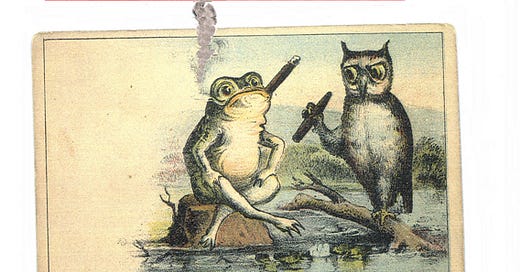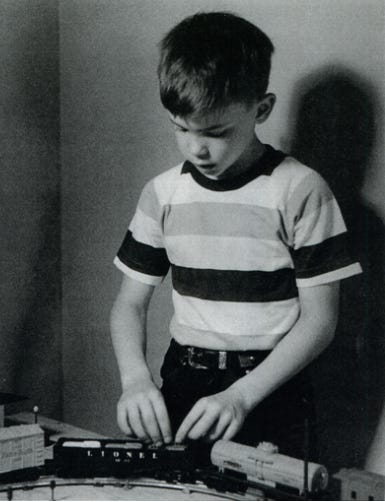"COWLICK," (I narrated this one in my movie Emerald Cities...) and more. Excerpted from TWELVE DEAD FROGS AND OTHER STORIES, A FILMMAKER'S MEMOIR.
https://www.magersandquinn.com/product/12-DEAD-FROGS--OTHER-STORIES/14684766
—————-
TRAINING WHEELS (1951)
When I was seven my family temporarily moved from Chicago, hoping a winter in Sarasota, Florida would help relieve my father’s developing emphysema. I initially enjoyed the beach weather and spent a lot of time just roaming around, fishing and adding beautiful and unusual shells to my collection. It was fun living there, but there were also some hidden dangers.
I clearly remember being placed on the seat of a bicycle by my new (older) Floridian “friends,” and getting my first two-wheeler, bike riding lesson, right into ongoing traffic. They gave me a running push into a large circular intersection, where cars merge and exit around a small central island (complete with palm trees of course). It became immediately clear to me that I would die if I didn’t keep pedaling while maintaining balance. And somehow, I did rise to the occasion, steering my bike shakily between speeding cars and parked ones, until I could maneuver it off into a driveway where I fell over. I looked for new friends after that.
My Floridian grammar school, located in raised quonset huts that closely resembled WWII prison camps that I’d seen on TV, also supplied challenges. To qualify for receiving dessert (the only edible part of the lunch meal as far as I was concerned), I surreptitiously spooned my macaroni and cheese servings under my chair each day to clear my plate. I wonder what the janitor thought, finding that regularly-occurring pile of noodles on the floor .
One thing I did enjoy, though, were the art projects, which I continued back home after school let out. I remember being very proud of a watercolor painting I did of our house, spending mornings and afternoons for three days straight, sitting out on the front lawn, meticulously coloring everything in. I did my best to render the small bungalow, green lawn and plants, accompanying palm trees in the wind and blue sky. Already, I was earnest about the work.
SILVER PITCHFORK (1952)
Back home in Chicago, about eight years old now, I settled back into making wood sculptures out of orange crates in the basement, and playing with my Lionel train. I thrived on the time spent alone, and was always less than enthusiastic when I had to break for meals or other activities. It was clear that my emotional wellbeing depended on solitude. My mother had to call out repeatedly from the first-floor basement doorway before I would reluctantly trudge up the stairs to join the family for dinner.
Around this time, I walked to a nearby hardware store about seven or eight blocks away (can eight- year-olds still walk a mile by themselves on the South Side of Chicago?) and spent all of my savings – around $6 – on a beautiful, silver-and-blue-painted spade garden fork (like a pitchfork, but with just four thicker tines). I have no idea why I bought it, or what I thought I’d do with it once I got it home (we had no garden). But I do remember loving it, and being extremely proud of my purchase. Maybe it’s a clue to my past life as a farmer in Illinois or somewhere. That’s the only explanation I can offer.
COWLICK (1953)—I told this story in my movie, Emerald Cities.
One interaction with my father that I remember clearly was when he took me to get a haircut when I was nine or ten years old. I was sitting in the barber’s chair, hoisted up and spun around to where I was facing the mirror, while he and the barber had an argument over where to part my hair. The barber was adamant that my hair should be parted on the left side, while I preferred the right, where it naturally fell. It developed into a real battle of the wills.
Caught in an art-trance in the basement of my Chicago home. It took me six months to save up enough money to buy just one two-way switch for my Lionel track.
The barber explained to my father that for me to be “normal,” I’d need to have my hair parted on the left. Left side...like everybody else, he insisted. But I had a cowlick that resisted that arrangement, and I had gotten into the habit of combing to the left, which worked just fine. The barber wouldn’t back down, though. He kept insisting that it my hair be parted “correctly.” But my father stuck by me, all the way on this, telling the barber to just do whatever I wanted. The barber’s last words before reluctantly giving in, were, “OK, but he’ll never fit into society.”
Grudgingly, he took his comb and scratched a line through my fine brown hair, from above my right ear forward, still mumbling under his breath, ...never fit in. (How did he know?) What’s important, of course, was that my father, in this particular instance, was on my side, supporting me 100%.
MISSING WALLET (1954)
At ten I had a white friend who lived somewhere near 47th street (we lived on 49th) near the beginning of the black section of Chicago’s South Side. He never invited me to his house, so I have no idea where or how he lived, but he’d drop by my house occasionally to play. I remember he was dressed in unusual clothes, a little shabby perhaps, a bit like Huckleberry Finn with floppy hat and suspended trousers. He resembled a kid you saw pictured in some 1920s magazine. Anyway, he seemed nice, so we hung out together when he showed up and traded some comic books. He had a lot of good science fiction issues, those scary comics where the cover illustration shows a doctor who is turning into an insect, face horribly half-dissolved in a red sea of blood and corpuscles. He definitely brought some new information into my life with those strange comics. And luckily, he desired my 3-D Mighty Mouse issues, making our trades mutually agreeable.
I could sense that his presence in our house made my mother a little nervous because, as she explained, she didn’t know his parents. She had mentioned this to me a couple of times after we’d played, and maybe it had some bearing on what eventually happened. One day, soon after he left, I noticed my wallet missing. I had something like twelve dollars in it and was horrified that it was gone. I searched my room hastily and it still didn’t turn up. I can’t remember if it was my mother or myself who eventually suspected my friend from “across the tracks,” but, in any case, we jumped in our 1939 Chevy and drove quickly in the direction of 47th street. Maybe we could catch him before he disappears, was something like what Mom said.
While part of me hoped we’d find him, another part dreaded the confrontation. I still remember the uneasiness I felt, my ears burning, face red, as we drove along. When we located him a couple blocks away we pulled over, and my mother asked if he had taken my wallet. He answered a simple, No.
The uncomfortable moment stretched out as he stood there, my mother and me staring at him from inside our car. Finally, my mother said something that freed him up, because he turned away and resumed walking. I could tell by his facial expression and body language that he’d been hurt. I never saw him again. Later that evening, I found my wallet with all its money. It was stuck underneath the bed.
PINKY LEE (1954)
I learned a lot from watching TV, mainly that I loved Howdy Doody, Hopalong Cassidy, Science Fiction Theatre, Mr. and Mrs. North, Boston Blackie, and almost all movies. I sent away for decoding rings, other gizmos, even receiving a clear plastic sheet of acetate to stick on the screen. A viewer had just a short time to grease-pencil in a inch-long line, tracing each week’s clue for winning prizes. When it was announced that Pinky Lee, a local cartoon show host, would make a guest appearance at the park behind my house, I was thrilled beyond belief.
After spending a couple of dollars of my allowance buying a new roll of film for my Brownie camera, I loaded it and carefully watched the calendar so as not to miss the big event. On the appointed Saturday morning, I raced out the front door, turned a quick right and ran fast down the sidewalk, hoping that I wouldn’t be late. Suddenly the camera slipped out of my hands and hit the pavement, the impact somehow knocking open the light-tight back lid. In an instant, my dream of recording Pinky on film had been ruined. I stood there in shock, tears dripping from my eyes. I scooped up my camera with its visible film roll and headed back home. It just wasn’t worth it – seeing Pinky Lee – if I couldn’t get some shots.
Stories excerpted from TWELVE DEAD FROGS, ©Rick Schmidt
————-
REVIEW of “12 Dead Frogs/Goodreads
Twelve Dead Frogs and Other Stories, a Filmmaker's Memoir by Rick Schmidt is an entertaining and insightful memoir and must read for everyone who aspires to become who they truly are, as artist and human being.
Filmmaker, writer, educator Schmidt takes us on a journey back in time to the beginnings of his artistic inclinations, and forward as he shares the path of making his award winning low-budget films and writing his best-selling Penguin book, Feature Filmmaking at Used-Car Prices.
His life story is a soulful adventure of self-actualization through artistic invention, self-expression, perseverance and resilience, with a healthy dose of humor with a profound sensibility to the absurd in everyday life sprinkled on top. He's told his story mostly in one-to-three-page anecdotes that are full of emotion – they made me laugh and cry.
We learn how Schmidt's artistic style and career as an independent film artist and author was shaped by his personal life and the cultural historical forces of the times, including the San Francisco Bay Area post-1960's art scene. His recollections are both fun and agonizing to read, being inspired as they were by the ups and downs of love and life, and the difficulties of balancing family life with the ever-present call of his artistic muse.
I'm still thinking about Frogs two-weeks after reading it. It's powerful. I'm going to read it again before giving it to my son. Bravo to Rick for exposing his innermost feelings to his readers and for bringing the creative and emotional threads in his life and work together in this wonderful book.






OMG! Cowlick. "You'll never fit into society with your hair parted on the wrong side." I WANT TO SEE THAT MOVIE, feature length stand-alone, and I want Sam Rockwell to play the adult response to that hilarious (probably not at the time) warning. I'm sure there are some wonderful child actors to play the kid part of the role. Such a perfect example of the ridiculous/outrageous things some adults consider important for kids to take on.